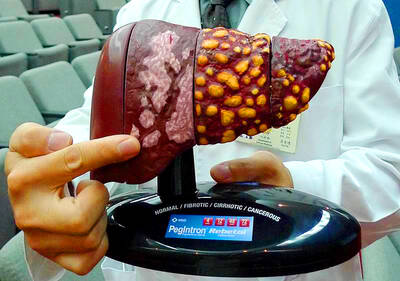US Deputy Director of National Intelligence for Analysis Tom Fingar said yesterday that the outcome of the presidential election in Taiwan may have lowered Beijing’s anxieties over the cross-strait situation, but would not put an end to the modernization of its military.
Susan Shirk, former deputy assistant secretary of state during the Bill Clinton administration, said China could seek to shift the world’s attention away from Tibet by dealing with Taiwan.
Beijing has already said it is willing to use “one China, two interpretations” as the basis for cross-strait dialogue. A major breakthrough on Taiwan can be expected in the next few months, she said.
Both specialists made their remarks at a forum on the new political stars of China organized by the Brookings Institution in Washington.
Asked if China could take a softer and more flexible approach to Taiwan in light of the election of the Chinese Nationalist Party’s (KMT) Ma Ying-jeou (馬英九), Fingar said he did not know, but wondered whether the Chinese leadership understood how to deal with the situation and the opportunities presented.
Fingar said that a richer China was unlikely to emulate the Japanese model by outsourcing its national defense. China would continue to develop its defense capabilities — especially its force projection.
The Tibet problem is not going to disappear, Fingar said, because it is a conflict of two cultures.
The Tibet dilemma, he said, is not merely a problem of the Han Chinese versus Tibetans, but rather who would be the real beneficiary behind the opening up of the region.
The Chinese leaders treat the Tibet situation as a domestic problem. Even without the Olympic Games, the issue would have surfaced at another time, he said, adding that the problem would persist unless Beijing changes its approach in resolving the issue.
China has always prioritized domestic stability over its international image and this time was no exception, Shirk said. The approach has sharpened outsiders’ view of China’s rising nationalism and that is why, in the short term, the Chinese leaders will probably not take a moderate approach toward the Dalai Lama and Tibet.
She said that China had successfully curbed the Taiwanese independence movement in the past few years and believed Chinese people would not care much about the basis of a cross-strait dialogue.
Some US academics, however, felt that Shirk’s views on the cross-straits issue were overly optimistic and questioned whether long-term US interests might not be better served if Washington encouraged Beijing to engage in dialogue with the Dalai Lama.
Some also disagreed with her assertion that China would shift the focus on Tibet by dealing with Taiwan.

The Taipei Summer Festival is to begin tomorrow at Dadaocheng Wharf (大稻埕), featuring four themed firework shows and five live music performances throughout the month, the Taipei Department of Information and Tourism said today. The festival in the city’s Datong District (大同) is to run until Aug. 30, holding firework displays on Wednesdays and the final Saturday of the event. The first show is scheduled for tomorrow, followed by Aug. 13, 20 and 30. To celebrate the 30th anniversary of Disney Pixar's movie Toy Story, the festival has partnered with Walt Disney Co (Taiwan) to host a special themed area on

Aftershocks from a magnitude 6.2 earthquake that struck off Yilan County at 3:45pm yesterday could reach a magnitude of 5 to 5.5, the Central Weather Administration (CWA) said. Seismological Center technical officer Chiu Chun-ta (邱俊達) told a news conference that the epicenter of the temblor was more than 100km from Taiwan. Although predicted to measure between magnitude 5 and 5.5, the aftershocks would reach an intensity of 1 on Taiwan’s 7-tier scale, which gauges the actual effect of an earthquake, he said. The earthquake lasted longer in Taipei because the city is in a basin, he said. The quake’s epicenter was about 128.9km east-southeast

BE CAREFUL: The virus rarely causes severe illness or death, but newborns, older people and those with medical conditions are at risk of more severe illness As more than 7,000 cases of chikungunya fever have been reported in China’s Guangdong Province this year, including 2,892 new cases last week, the Centers for Disease Control (CDC) yesterday said it is monitoring the situation and considering raising the travel notice level, which might be announced today. The CDC issued a level 1 travel notice, or “watch,” for Guangdong Province on July 22, citing an outbreak in Foshan, a manufacturing hub in the south of the province, that was reported early last month. Between July 27 and Saturday, the province reported 2,892 new cases of chikungunya, reaching a total of 7,716

STAY VIGILANT: People should reduce the risk of chronic liver inflammation by avoiding excessive alcohol consumption, smoking and eating pickled foods, the physician said A doctor last week urged people to look for five key warning signs of acute liver failure after popular producer-turned-entertainer Shen Yu-lin (沈玉琳) was reportedly admitted to an intensive care unit for fulminant hepatitis. Fulminant hepatitis is the rapid and massive death of liver cells, impairing the organ’s detoxification, metabolic, protein synthesis and bile production functions, which if left untreated has a mortality rate as high as 80 percent, according to the Web site of Advancing Clinical Treatment of Liver Disease, an international organization focused on liver disease prevention and treatment. People with hepatitis B or C are at higher risk of